How a Piece of Cake Helped Me Hold On to My Memories
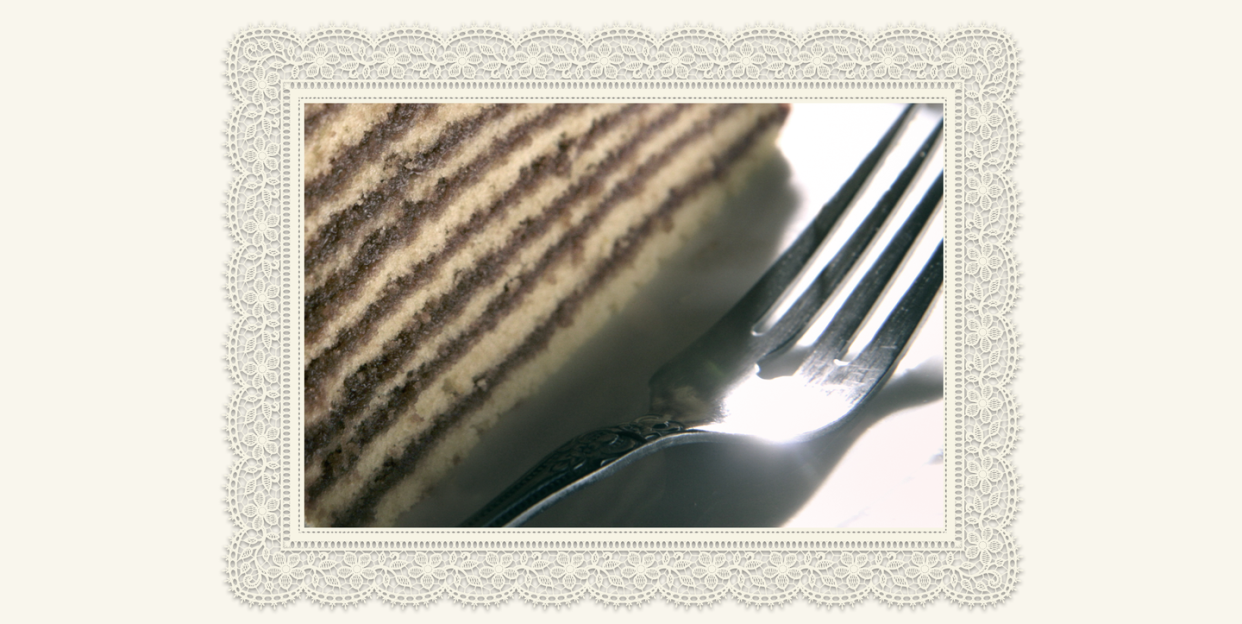

“You have to try the cake,” my grandmother said. “Everyone comes here for the cake.”
It was 2002 and I was 21, sitting next to my 23-year-old sister in the backseat of our grandparents’ boat of a Cadillac as my grandfather captained it down a two-lane road to Crisfield, a sleepy coastal town in Maryland.
My grandparents were adventurers. They had taken my sister and me on far-flung trips all over the globe when we were teenagers, including perhaps most memorably, to Alaska, where they insisted the only proper way to see the glaciers was from the inside of a single-engine turboprop airplane. That may be true, but when your eyes are closed in terror the entire ride, you tend to miss the scenery. The summer of 2002, we were supposed to be in London, drinking pints in pubs, watching grand theater productions, learning about beheadings at the Tower. But due to the terrorist attacks of Sept. 11 the previous fall, our grandparents decided it was safer to stay stateside, grounded, and more specifically, just 90 miles from their home in Salisbury, MD.
In Crisfield, we boarded a ferry to traverse the 12 miles through the gray Chesapeake Bay waters and land on Smith Island, a 9.2 square mile strip of land, that only had about 300 residents at the time, and apparently one remarkable cake.
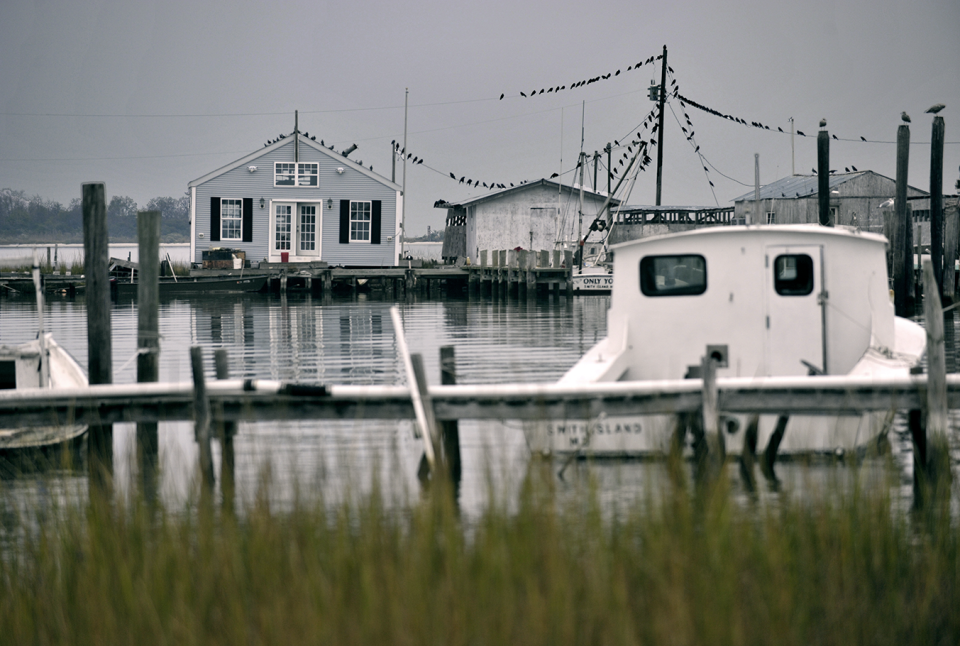
If you think I was disappointed about this change in plans, you’d be wrong. I was absolutely devastated. But I accepted this alternate, mainly because my grandparents were paying for everything and I was an unemployed college student who couldn’t otherwise afford a vacation.
After 45 minutes of a seasickness-inducing bumpy boat ride, a few trees appeared on the horizon. As we got closer, we saw the docks, crawling out into the bay like crooked witches’ fingers, and then a few dilapidated wooden shacks, which I later learned were crab shanties where watermen sort their catch at the end of each day.
Once we made it to dry land, it took us about 15 minutes to tour the town. There was a general store, a post office and an elementary school (middle and high schoolers had to ferry over to the mainland daily). There were no police. There was no Target. There was no alcohol.
It was unbelievable to my 21-year-old self that people lived on this island—so far from the mainland, dependent upon a small boat to retrieve necessities like milk or ramen noodles or celebrity magazines.
But we were here on a mission: The Cake. The restaurant that served it was as rundown as the crab shanties. I remember walking up a rickety wooden wheelchair ramp. I remember grease on the walls, peeling linoleum on the floor. I remember eating a halfway decent sandwich that had too many green peppers on it. And I remember The Smith Island Cake. Ten layers of thin yellow cake, separated by creamy, decadent chocolate frosting. It was delicious.
“See?” my grandmother said, smiling. “I told you. The cake.”
The cake, indeed.
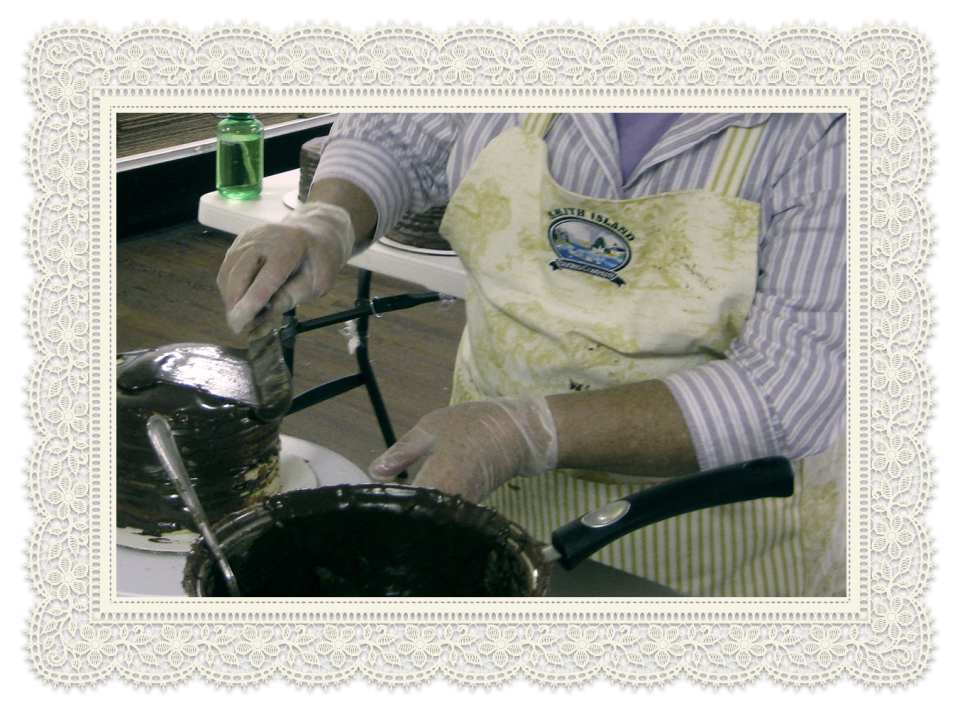
Time passed, but my memory of the cake persisted
Fast forward nearly two decades. I was no longer a surly 21-year-old, but a mother of four. A writer. I traveled as often as I could to Salisbury, MD to visit my grandmother, and we enjoyed many memorable restaurant meals—and desserts—together, but we never ventured to Smith Island or ate Smith Island cake again. Of course, if anyone asked me my favorite dessert, I would wax rhapsodic about this perfect confection, which happened to be Maryland’s state dessert, and rightfully so. And then, in January 2018, I was working on a novel that I had decided to set on my own version of Smith Island. On one of my recent visits, I explained the idea to my grandmother. “Well, let’s go,” she said. She was 90 or so. Her eyesight had been fading in recent months. She used a walker (not that she needed one, she’d be quick to tell you). And she had stopped traveling years before, shortly after my grandfather had passed.
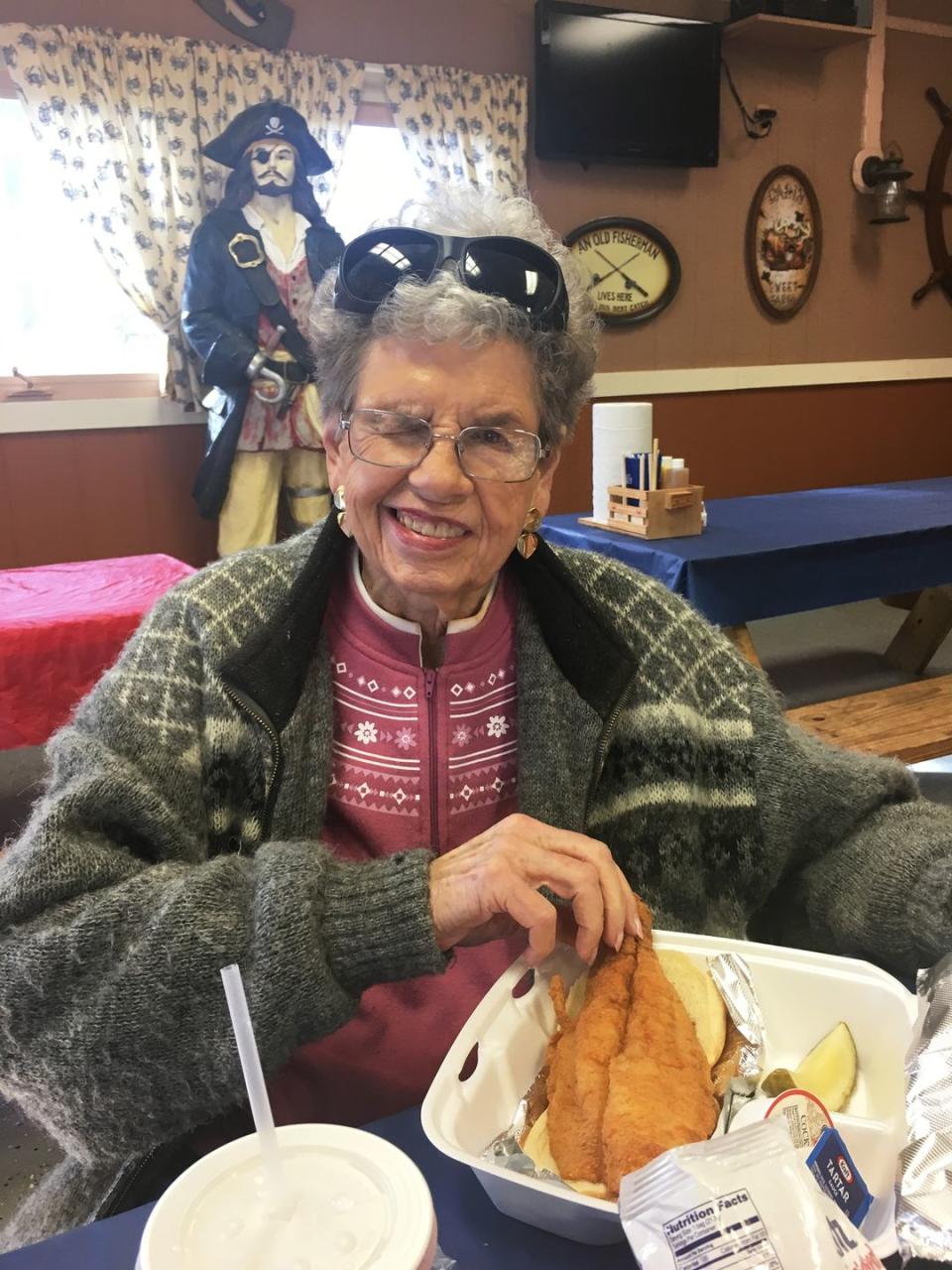
“Really?” I said.
“Why not?”
So we went. We drove the same two-lane road to the now-even-more desolate town of Crisfield. I was worried about how my grandmother would fare on the ferry ride. But I didn’t need to worry. It was January. The ferry was not operating for tourists. We stood on the dock, the bitter wind in our faces, our hair. “I was looking forward to the cake,” she said, wistfully. I had been, too.
On the way home, a few miles outside of Crisfield, a sign appeared like a beacon. Smith Island Cake sold here, it said.
I grinned at my grandmother. She grinned at me. We stopped.
It was a shack, very similar to the shack on Smith Island. My grandmother navigated her walker up the rickety wooden wheelchair ramp, the floor was peeling linoleum. No sandwiches, but we both ordered the fried softshell crab and marveled over its perfect briny flavor—not too fishy, not too greasy, the perfect crunch.
But we had saved the best for last: The Smith Island Cake. I let her have the honors of the first bite. She put it in her mouth. Closed her eyes. Chewed. Opened her eyes. Screwed her face.
“It’s terrible.”
“What?”
I scooped my own forkful.
“Ugh, you’re right.”
It was sweet. Sickly sweet.
“Oh well,” my grandmother said.
But I was devastated. Well, not going-to-Smith-Island-instead-of-London devastated. But I was at least disappointed. How could my memory have been so far off? I had dreamt of that cake. And now.
The cake taught me about memory
Maybe the person who baked this particular cake had an off day—didn’t follow the recipe or added too much sugar. Or maybe Smith Island Cake is similar to how I only enjoy Guinness in Ireland or how pasta tastes better in Italy. Or maybe my memory of the cake is clouded by my grandmother’s excitement, by her contagious joy at the adventure we were experiencing together. The truth is, like pasta in Italy, everything was better in my grandmother’s presence. But that day, even she couldn’t save this slice of cake.
Memory is a funny thing. In the last months of her life, my grandmother suffered late-stage Parkinson’s. She had hallucinations, memories that weren’t real. She believed outrageous things at times: that she owed great gambling debts, that my aunt had been to jail for murder, that there was a submarine just below the nursing home she lived in and the staff took her down a ladder for tours.
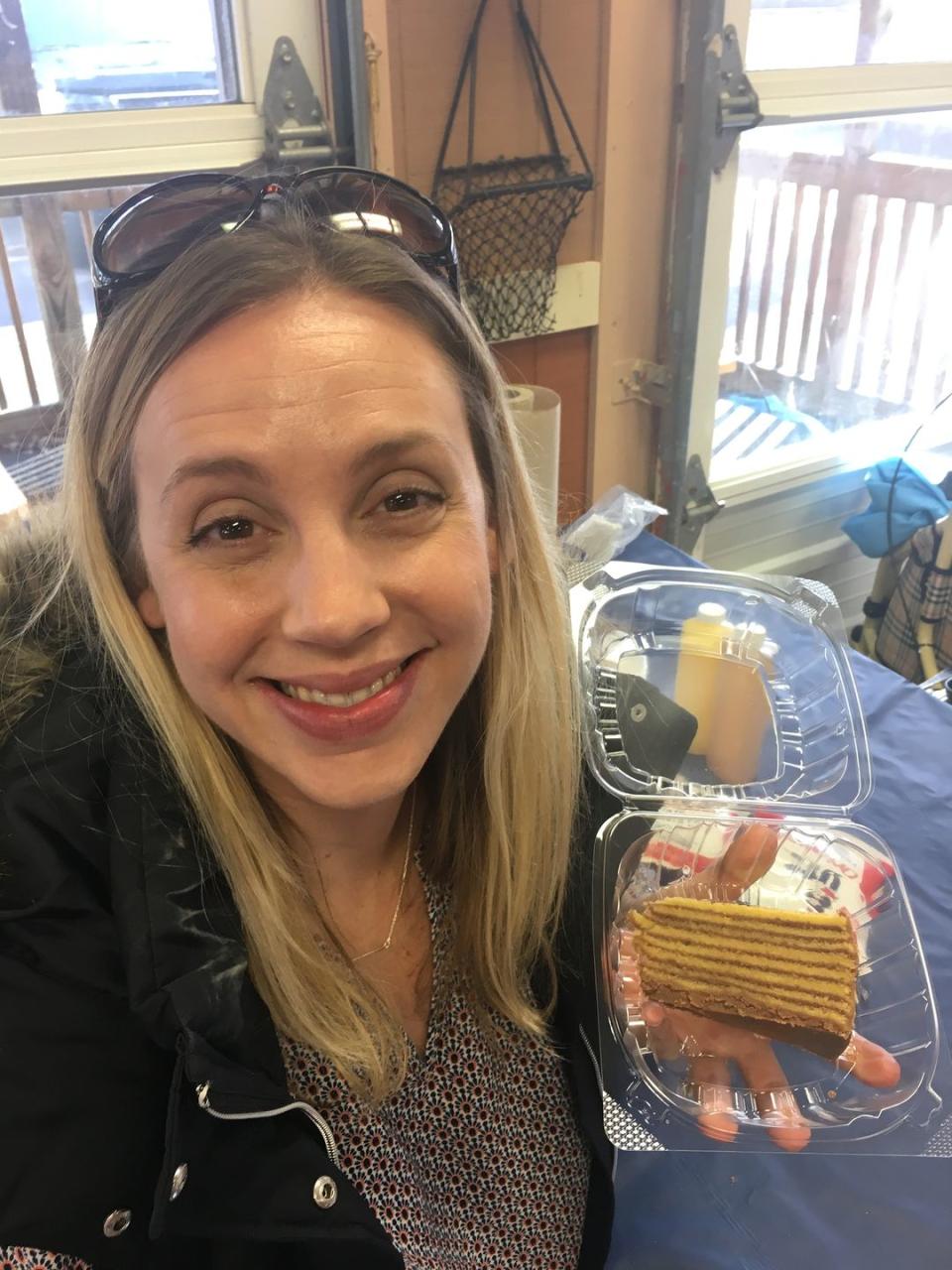
One of the last times I visited her there was in April 2019, on the tail end of a true research trip to Smith Island for my book. She couldn’t join me, so my mother came along in her stead. We stayed at Susan’s on Smith, a quaint bed and breakfast with an unobstructed, million-dollar view of the Bay. Not too shabby for a place that, at the time, rented out for $137 a night. From my 38-year-old perspective, it wasn’t crazy that people lived out here, in the middle of nowhere. It was genius. A breath of fresh air, literally. My cell phone didn’t work. There were two other tourists besides us. No bars. No traffic. It was heaven.
And Susan, the eponymous owner of the bed and breakfast, served us a delightful dinner on her front porch, a few large glass windows the only thing between us and that view. She brought out dessert: A hefty slice of Smith Island Cake. I looked at it dubiously and gave the fork to my mother.
She took a bite. Closed her eyes.
“Oh my,” she said. “It’s delicious.”
And it was. Still not quite as good as I first remembered it, but I wonder if anything ever is as good as our memories. As soon as we got back to my grandmother, I rushed to tell her, about the trip, about the cake.
“That’s lovely,” she said, and then she turned to my sister, who was not there. “Hello, sweet girl.”
Now, when people ask the most fascinating, the best, the coolest place I’ve ever travelled, I don’t tell them about Alaska and the prop plane or seeing the statue of David in Florence in person or Treasure Beach, Jamaica where I slept with barn doors flung open to hear the sounds of the crashing ocean. I tell them about Smith Island, an unassuming place off the coast of Maryland that most people have never heard of.
And I think of my grandmother, who died at the age of 92 in 2020. I remember her—the excitement in her eyes, her love of adventure (and dessert!) that I’m so glad to have inherited, her voice, a bit warbly in her old age, but always full of love. I smile. Or I cry. One never knows how grief will manifest itself on any given day.
“If you go, you’ve got the try the cake.”
Colleen Oakley is a writer in Atlanta, Ga. Her fifth novel, The Mostly True Story of Tanner & Louise—partly inspired by her beloved grandmother—comes out in March. This essay is part of a series highlighting the Good Housekeeping Book Club — you can join the conversation and check out more of our favorite book recommendations.
You Might Also Like

